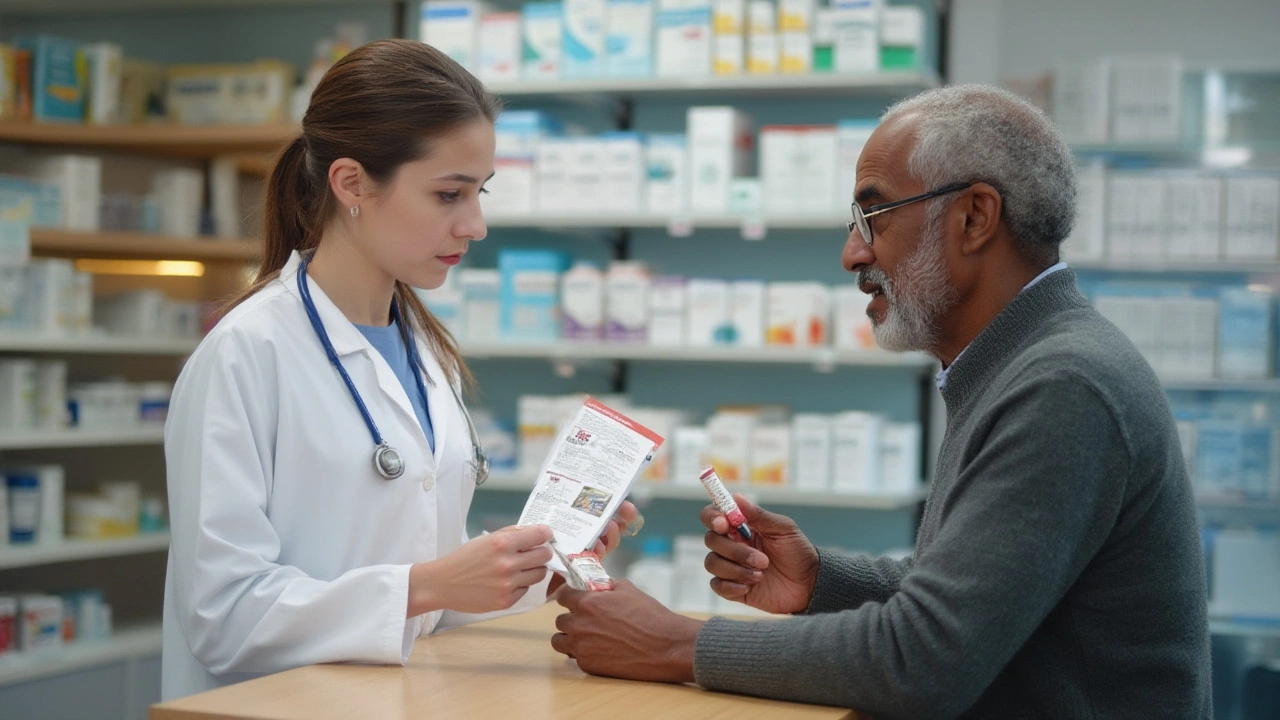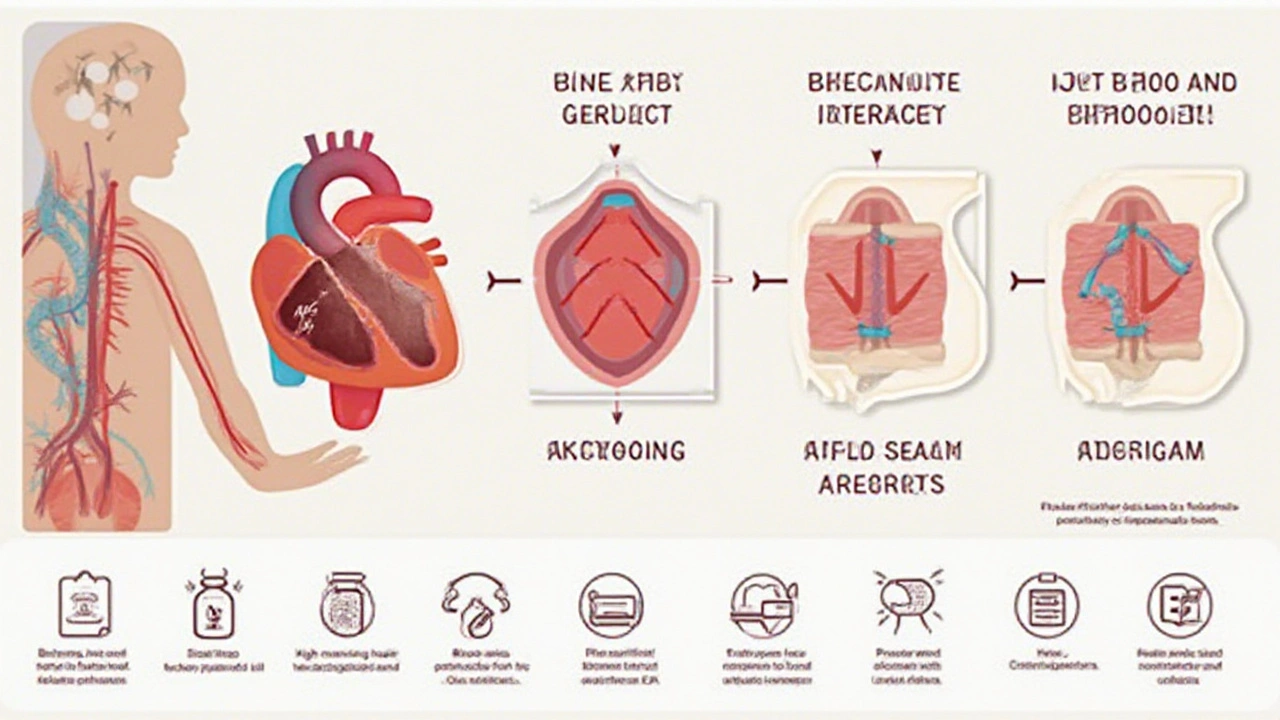Imagine swallowing a tiny, peach-colored tablet and giving your heart a fighting chance. That’s not hype—it’s what many people with high blood pressure experience every morning with Micardis, the prescription medication whose generic name is telmisartan. While high blood pressure might sound like some distant risk, it’s one of the quietest, most patient killers out there, gradually straining the heart, damaging blood vessels, and raising the stakes for strokes and heart attacks. So why do people reach for Micardis, and what makes it a staple in so many medicine cabinets?
What Exactly Is Micardis—and Why Do People Take It?
Micardis sits in a class of drugs called angiotensin II receptor blockers, or ARBs if you like shortcuts. Its main job? Lowering blood pressure, but there’s more going on than you might think. Telmisartan gets in the way of the hormone angiotensin II, which normally tells blood vessels to clamp down and raise blood pressure. By blocking angiotensin II, Micardis coaxes those vessels to chill out and widen, making it easier for blood to flow.
Why does this matter? Blood pressure that creeps up and stays there is a huge, sneaky risk. According to CDC numbers from 2023, nearly half of US adults have high blood pressure—and about 1 in 4 don't even know it. High numbers are often called the “silent killer” because you usually feel fine—until something breaks. Heart attack. Stroke. Even kidney failure.
Micardis is most often prescribed to people whose blood pressure isn’t behaving despite diet tweaks or exercise. But it has an extra trick: some doctors use it for protection in people with type 2 diabetes or those who already have kidney trouble. There’s even evidence that Micardis can help prevent strokes in folks at high risk—even if they've never had one before.
Want to make it work? This isn’t a “pop a pill and forget it” scenario. Consistency matters. If you take Micardis once every morning, try to do it at the same time each day. That helps your body keep an even keel and means you’re less likely to skip a dose. The standard dose usually starts at 40 mg but can move up to 80 mg, depending on what your doctor decides and how stubborn your numbers are.
Here’s something many forget: it takes a couple of weeks for Micardis to hit full power. Don’t get discouraged if your blood pressure doesn’t plummet overnight. And don’t stop, thinking it’s not working. Always check with your doctor before making any changes—sudden stops can send your pressure surging again.
You’re probably wondering about drug interactions. Good instincts. Micardis can butt heads with lithium (used for bipolar disorder), certain diuretics, or NSAIDs like ibuprofen. Even potassium supplements or salt substitutes can be risky—blood potassium might rise too high. Your doctor should go over this, but check all your meds, even the “natural” ones.
| Statistic | US Data (2023) |
|---|---|
| Adults with high blood pressure | 47% |
| People unaware of diagnosis | 24% |
| Number prescribed ARBs (like Micardis) | Over 13 million |
If you have liver issues or dehydration (maybe from being outside during a rare Portland heatwave), Micardis can hit harder, so your doctor might start at a lower dose. The same dose doesn’t fit everyone.
If you're curious whether food messes with absorption, here's some good news: Micardis can be taken with or without meals. That’s way easier than some meds that need to go down on an empty stomach or are picky about dietary fat.
Quick tip: set a phone reminder or stick the bottle next to your toothbrush. With silent conditions like hypertension, it’s frustratingly easy to forget—even when you know better.

Side Effects and What You Might Actually Notice
No medication is totally drama-free, and Micardis keeps things interesting. Most people do fine, but it’s smart to know what’s possible so you can spot something early rather than ignore it.
The most common side effect is dizziness—especially at the beginning, or if you stand up too fast. Your body usually gets used to lower blood pressure, but the first few days can feel a little wobbly. Some people deal with back pain, sinus stuffiness, or tiredness. Not fun, but usually nothing a solid night’s rest and a little patience can’t fix.
About 2% of folks in clinical trials ditch Micardis because of side effects. Compare that to some older blood pressure meds, where one in five people walks away. The numbers stack up pretty well in telmisartan’s favor.
But what about the scarier stuff? Hyperkalemia—that’s just a sciencey way of saying high potassium—can be a problem, especially if you already have kidney disease or are taking potassium-boosting meds. If your hands start tingling, you feel muscle weakness, or you notice a weird, irregular heartbeat, that’s not something to ignore.
It’s rare, but allergic reactions can happen—think swelling of the face, lips, tongue, or trouble breathing. That’s ER territory. And while headaches and cough tend to pop up more with certain blood pressure pills (like ACE inhibitors), they’re not impossible with Micardis.
Women who are pregnant—or might get pregnant—need to stay away. Micardis messes with how a baby’s kidneys and brain develop, especially after the first trimester. Even the FDA gives it a strong thumbs-down for pregnancy. If you find out you’re pregnant, call your doctor, like, yesterday. Breastfeeding? Also a no. Micardis hangs around in breast milk, and nobody’s sure what that does to a tiny human.
Curious if you’ll notice side effects right away? Most either show up in the first couple weeks or not at all. Still, Micardis impacts the body over time, so doctors usually do some routine blood tests—especially in the first few months. Expect check-ins for kidney function, blood electrolytes (mainly potassium), and sometimes a look at liver enzymes. If your numbers change, your doc might need to tweak things.
If you’ve had angioedema (bizarre swelling, usually with ACE inhibitors), let your healthcare provider know before starting Micardis. Even though it’s less likely with ARBs, better safe than sorry.
Real talk: don’t chase side effects on Google forums. Stick to trusted sites or—better yet—ask your provider. Every body is unique, and most side effects aren’t as common as open-ended searches suggest. Lots of people live their best lives on Micardis with barely a hiccup.

How to Make Micardis Work for You: Practical Tips and Real-World Life Hacks
You can have the best medication in the world, but if it sits forgotten behind the takeout soy sauce packets, it’s not doing much good. Getting Micardis to pull its weight means weaving it into your daily rhythm—and making some life tweaks that support healthy blood vessels along the way.
If you live somewhere with a pharmacy as close as the corner coffee shop (hello, Portland), take advantage of those auto-refill programs. Running out of Micardis because you forgot to call in a refill? Preventable. Most apps these days can ping you before you’re dangerously low.
Micardis isn’t picky about food, but it’s sensitive to dehydration. Picture yourself gardening in July, sweating like crazy, and skipping your water bottle. That lightheaded feeling could mean your blood pressure’s dropped too far. Pair your pill with a tall glass of water—bonus points if you keep sipping throughout the hot months.
Let’s talk salt. Telmisartan helps your arteries relax, but a steady diet of ramen and salty chips works against it. Experts suggest most adults keep sodium below 2,300 mg a day. That’s about a teaspoon, by the way, and way less than you’d think if you’re eating out or grabbing takeout. Swapping out that instant soup for something homemade cuts your sodium and lets Micardis actually do its thing.
People often ask, “Can I drink while on Micardis?” Small amounts of alcohol usually aren’t a deal-breaker, but heavy drinking can mess with your blood pressure and the way your liver handles the drug. If you enjoy the odd IPA or glass of pinot noir, just do it in moderation and know your limits. If you notice extra dizziness, rethink that second drink.
Mixing stress with high blood pressure pushes everything in the wrong direction. Even a chill walk along the Willamette or some basic yoga can steady your numbers. Micardis does the heavy lifting, but you get better results if you put in some lifestyle effort too.
| Tip | Details |
|---|---|
| Take medication at the same time daily | Builds a habit and keeps blood pressure stable |
| Monitor blood pressure at home | Handy for spotting trends and bringing real numbers to doctor visits |
| Watch for dehydration | Stay hydrated, especially during summer or after exercise |
| Alert doctor to any new meds—even OTC ones | Prevent risky drug interactions |
| Keep salty foods in check | Too much sodium can undo Micardis' effects |
If you ever miss a dose, don’t try to double up. Just take the next one at your usual time. It happens to everyone, and doubling up only risks dropping your pressure too far.
Some folks worry about taking telmisartan long-term. Here’s a reality check: studies back in 2021 followed people for years, even a decade or more, with strong results for blood pressure and a low rate of major side effects. No, you don’t “build a tolerance.” But yes, if your numbers stabilize and your doctor thinks you can taper down, it might be worth asking about the plan.
If you’re planning surgery, dental work, or anything that could mess with your fluid levels, tell your medical team about Micardis. Sudden shifts in blood pressure during anesthesia can complicate things.
For those living the Pacific Northwest healthy lifestyle, yes, you can still go hiking, cycling, or try that trendy barre class on Micardis. Just listen to your body, stay hydrated, and bring a buddy if you’re new to exercise or feeling off.
And if you’re ever traveling? Pack your medication in your carry-on—not your checked bag—to avoid any “vacation without a pill” horror stories. Bring an updated medication list or snap a photo on your phone, just in case you need a refill while away.
Need one last reason to stick with Micardis (besides a longer, healthier life)? Blood pressure goals set by the American Heart Association (AHA) say that under 120/80 mm Hg is ideal. When you hit your numbers, you’re quietly stacking the odds in your favor. Heart disease, strokes, and kidney problems? Those are someone else’s problem.
Hypertension doesn’t have to be a silent threat in the background of your life. With Micardis, good habits, and a little attention to what your body’s telling you, you can live on your own terms—and that’s way better than sweating the small stuff.


8 Comments
Oh wow, Micardis, huh? Honestly, this drug sounds like just another way Big Pharma is milking us dry 😒. Like, they parade it as this wonder for blood pressure but what about the long-term side effects they conveniently don’t highlight? 🙄 I get that controlling hypertension is crucial, but I always feel like there’s some hidden agenda behind pushing meds so aggressively.
Anyone else feel like the side effects listed are just the tip of the iceberg? I’ve read stories of people feeling drained or bizarre symptoms that doctors dismiss or say are unrelated. Seriously makes me question how transparent they really are. Stay woke, folks! 💊🕵️♀️
Does anyone have any real-world tips or experiences with telmisartan? How did you manage side effects without just tossing the prescription? I’m all ears for safer ways to navigate this because sometimes it feels like we’re stuck between a rock and a hard place here.
Truly a complex matter, and the concerns about transparency are valid... but isn’t it also about balance??? I mean, high blood pressure can be life-threatening!!!
It’s a relentless fight against unseen enemies within our bodies!!! So the pharmaceutical companies might be profit-driven, yes, but the benefits of controlling blood pressure with something like Micardis should not be dismissed hastily!!!
The trick is, how do we safely navigate this?! We must remain cautious but hopeful — adopting medication responsibly along with lifestyle changes. To every warrior dealing with hypertension, take heart, you’re not alone!!!
It is imperative to consider the scientific literature regarding telmisartan's efficacy and safety profile. Multiple clinical trials affirm its utility in managing hypertension effectively with an acceptable adverse effect range.
Nevertheless, all therapeutic interventions carry intrinsic risks; hence, patient monitoring is essential. One must also be vigilant about contraindications and drug interactions.
Criticism should be based on evidence rather than conjecture. Responsible use under medical supervision is crucial to maximize benefits and minimize harms.
I appreciate the mix of perspectives here! It’s true that telmisartan can help many people control their blood pressure effectively.
Still, I think it’s important we keep supporting open communication between patients and healthcare providers to ensure side effects are addressed without judgment.
Also, acknowledging that health experiences can vary widely depending on personal and cultural backgrounds helps foster understanding and empathy in discussions like this.
Sharing experiences respectfully will encourage others to feel comfortable seeking the help they need.
To add, I must emphasize the profound responsibility accompanying drug prescription and public dissemination of such guides!!!
An informed patient is not merely a recipient but a partner in therapy. We must not let emotional skepticism cloud the evidence nor ignore lived realities of adverse reactions.
This Micardis guide should be thorough, addressing both promise and precaution with impeccable clarity. Anything less borders on negligence.
hey everyone, just jumped in after reading this thread.
i took telmisartan last year and honestly, it was kinda okay for me. the side effects weren’t too bad, just some dizziness here and there when i first started. i think it’s super important that ppl don’t freak out right away but also keep an eye on signs your body gives u.
anyone else wanna share tips on how to cope without going crazy??
It's reassuring to hear from people who've actually been through this, truly.
While it's natural to be worried about side effects, it's important to remember that managing blood pressure is a huge step towards maintaining overall health and longevity.
So many people have improved greatly on telmisartan, finding relief and better quality of life.
Sharing positive stories alongside the concerns can help us all stay hopeful and informed. Thanks for the honest conversation!
Hey, thanks for the cautiously optimistic viewpoints! 😊 I guess it’s easy to get caught up in fear when you hear about meds, but hearing about personal experiences helps balance things out.
Still, I will keep digging into alternative methods alongside meds to keep my health in check. It’s all about being proactive and informed, right? 👀✨
Write a comment